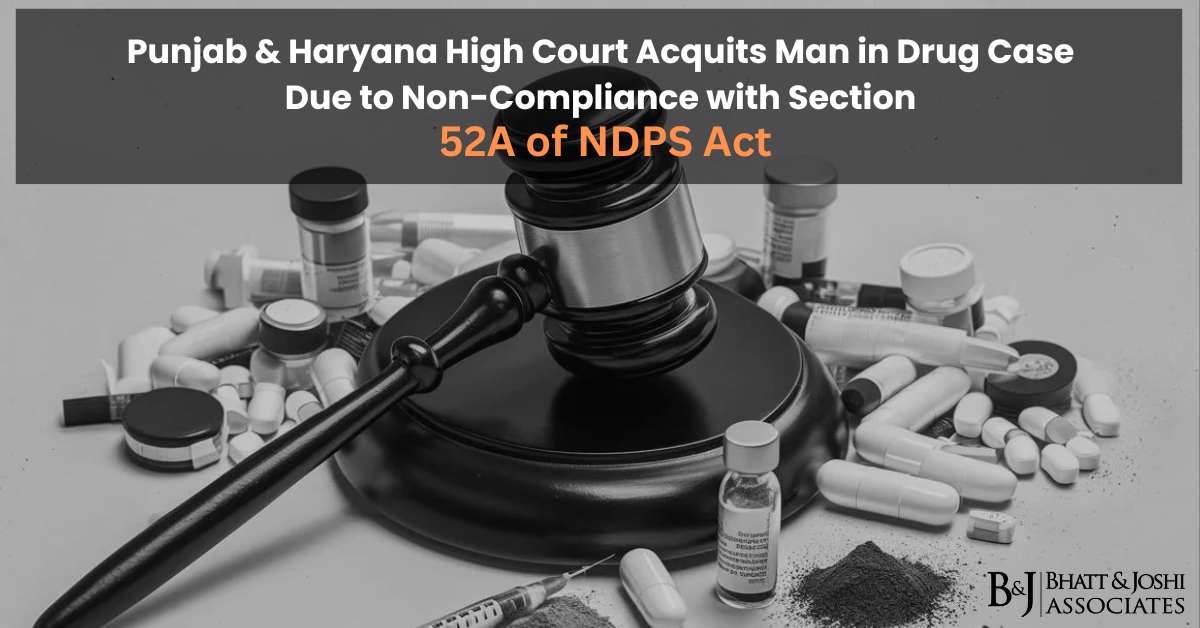Punjab & Haryana High Court Acquits Man in Drug Case Due to Non-Compliance with Section 52A of NDPS Act
Introduction
The Punjab and Haryana High Court recently acquitted a man convicted in a drug case due to non-compliance with Section 52A of the Narcotic Drugs and Psychotropic Substances (NDPS) Act. The court ruled that the samples were not drawn in the presence of the Magistrate, a mandatory requirement under the Act, which led to the acquittal.
Case Background
The case involved Janki Dass, who was convicted under Section 20 of the NDPS Act for selling 4 kg of contraband and was sentenced to five years of rigorous imprisonment and a fine of ₹23,000. The prosecution examined six witnesses, and after closing the evidence, the accused’s statement was recorded under Section 313 of the Code of Criminal Procedure (CrPC), to which he pleaded false implication.
Legal Provisions and Compliance Under Section 52A of the NDPS Act
Section 52A of the NDPS Act
Sub-section (1) of Section 52A: This facilitates the Central Government in prescribing a mode for disposing of seized narcotic substances.
Sub-section (2) of Section 52A: This mandates a competent officer to prepare an inventory of such narcotic drugs with adequate particulars, followed by an application to the Magistrate for certifying the correctness of the inventory, taking photographs in the Magistrate’s presence, and certifying them as true or taking samples in his presence with due certification.
Court’s Observations
Justice Kirti Singh highlighted,
“The mere fact that the samples were drawn in the presence of the Gazetted Officer is not sufficient compliance of the mandate of sub-Section (2) of Section 52A of the NDPS Act.”
The court explained that as per Section 52A(2)(c) of the NDPS Act,
“Upon seizure of the contraband, the same has to be forwarded either to the officer in charge of the nearest police station or to the officer empowered under Section 53 who shall prepare an inventory as stipulated in the said provisions and make an application to the Magistrate for purpose of (a) certifying the correctness of the inventory (b) certifying photographs of such drugs and substrates taken before the Magistrate as true (c) to draw representative samples in the presence of the Magistrate and certifying the correctness of the list of samples so drawn.”
Analysis of the Evidence
The court noted that the case property and appellant were produced before the SHO Police Station, who verified the facts and sealed the recovered property. However, the Forensic Science Laboratory (FSL) Madhuban stated that the sample was ganja.
The court found,
“No inventory was prepared by the Investigation Officer in regard to the contraband recovered containing quantity, mode of packing, marks, number or other such identifying particulars of the contraband so recovered. The samples were not drawn in the presence and under the supervision of the Magistrate which is complete violation of mandatory provisions of Section 52A of the Act.”
Justice Singh highlighted,
“No evidence has been brought on record to the effect that procedure prescribed under sub-Section (2) (3) and (4) of Section 52A of the NDPS Act was followed while making the seizure and drawing sample, such as preparing the inventory and getting it certified by the Magistrate.”
Conclusion: Implications of NDPS Act Section 52A Compliance
The court concluded that the trial court failed to notice the material infirmity in the prosecution’s case and wrongly recorded the conviction of the appellant.
“The learned Trial Court failed to notice this material infirmity in the case of the prosecution and fell into grave error in recording conviction to the appellant. Rather the benefit of the same should have been granted to the appellant.”
Consequently, the plea was allowed, and the court set aside the conviction. Recently, the Supreme Court held that when samples are not drawn following Section 52A, the FSL report is a waste of paper and cannot be read in evidence.
Counsels:
– Sukhcharan Singh Gill Advocate (Amicus Curiae) for the appellant.
– Mr. Rahul Dev Singh, Addl. A.G. Haryana.
Case Title: Janki Dass v. State of Haryana
 Whatsapp
Whatsapp


